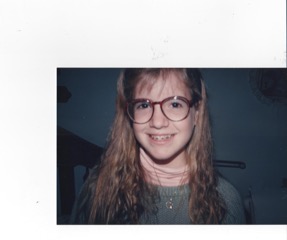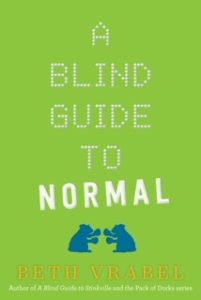“Everybody has a Story”
Everybody has a story.
As a writer and a reader, I know this to be true.
Write what you know.
This is another tenet that has stuck with me through my career with writing, especially as I moved from being a lifestyle columnist to a fiction writer. After all, is it any surprise that this girl (picture) wrote a book about a picked-on dorky fourth-grader? PACK OF DORKS, my debut novel, released in 2014.
Lucy’s story reflects many of my experiences as a 10 year old wondering if I’d ever make it to the “cool table” at the cafeteria. Only whereas fourth-grade me wallowed in dorkdom, Lucy stands up to her frenemies and bullies. Even better? She finds others to stand with her. With her “pack,” Lucy realizes she’s exactly where she wants to be. I gave Lucy the ending I wish I had been brave enough to give myself.
I’m proud of PACK OF DORKS, but shortly after it was published, I have to admit I also was embarrassed by the personal connection.
I was determined that my next book would be different. It’d be completely imaginative and new and unrelated to my own life. And do you know what happened?
Everyone died.
By page seventeen, all of my characters gave up the ghost. Again and again and again. My husband suggested I start writing short stories instead.
I stopped being embarrassed. I started being scared.
Scared that the only stories inside me were ones connected to my own life. Scared that I wasn’t original or fresh or, frankly, all that creative. And, like many of us do when we’re scared, I ran away from what frightened me—those personal connections. I still hadn’t learned my lesson that a bully must be faced head on, even when that bully is comprised of your own thoughts.
Luckily, something saved me.
As I recently shared in Albinism InSight magazine, shortly after we knew PACK OF DORKS would be published, my daughter asked me for help finding a book.
She wanted to read a book that dealt with a shared experience.
My daughter has albinism, like Alice. My girl’s albinism is mild—you probably wouldn’t recognize it in her when you met her. Her hair is strawberry blonde and her skin pale. Her eyes, like the eyes of everyone with albinism work differently and she is mildly visually impaired.
But we couldn’t seem to find a book, or even a movie, where a character had albinism yet wasn’t creepy, mystical or evil. Nowhere could we find a book about a regular girl who learns, grows, has friends and happens to have albinism.
Go ahead, give it a shot. Type in albinism—or worse, albino—into a popular bookseller’s website. I did and found the following:
- A dystopian young adult series in which people with albinism take over the world, destroying the lives of the “pigmented.”
- A crime mystery in which the sinister villain and art thief is called The Albino.
- A book about a young “albino detective” who is able to psychically solve cases.
- A story about an “albino witch” who uses her powers to force apart two lovers.
It made me angry. It broke my heart.
My husband and I work hard to show our daughter that though she was born with this challenge, it does not define her. She has more in common with everyone else than this one thing that might set her apart. We tell her again and again that everybody faces challenges.
And today my girl is 13, an avid reader, a brilliant student and, making me the most proud, one of the kindest people I know. We know albinism is beautiful.
That’s why is so frustrating to see it portrayed in such ugly ways.
And so I stopped running from my own connections; instead, I leaned into them.
I wrote the story I wanted my girl to have. A story about a 12-year-old girl named Alice. She’s smart and kind, capable and caring, brave though often overwhelmed. And she happens to have albinism.
Alice scouts out stories in her new town and proves to the townspeople, her family, and, most importantly, herself that blindness is just part of who she is, not all she can be.
It’s gotten great reviews. In fact, The International Literacy Association named it the winner of its intermediate fiction prize, which is a tremendous honor.
But the reviewer whose opinion means most to me has the bedroom next to mine.
And my daughter loves the book. She read it chapter by chapter as I wrote it. Her enthusiasm propelled me to dig deeper and shine a light on other issues too often buried in children’s literature.
Let me be very clear that my daughter and Alice are different. My daughter has her own story, just like each of us, one that’s hers to share whenever and however she’d like.
Everyone has a story.
My stories reflect me.
And here’s the irony—writing stories that mirror my heart has allowed me to write characters I never would’ve dreamed possible.
Characters like Richie Ryder Raymond. You’re introduced to this wise-cracking, witty and clever boy in STINKVILLE. Richie gets his own book in A BLIND GUIDE TO NORMAL, releasing Oct. 11 through Sky Pony Press.
Due to a childhood cancer, Richie has an artificial eye and low vision in his remaining eye. I don’t have a lot in common with a 14-year-old boy, let alone a cancer survivor.
But I do know how scary it is start something new. I know what’s like to want something you can’t ever have. I know what it’s like to be awkward and cover it with humor.
Once again, I relied on those shared experiences—and a lot of research—to live through my characters. I realize now doing this makes my stories original, keeps them fresh and requires creativity.
About the Author: Beth Vrabel is the award-winning author of A Blind Guide to Stinkville (winner of the 2016 ILA Award for Intermediate Fiction), A Blind Guide to Normal, and the Pack of Dorks series. She can’t clap to the beat or be trusted around Nutella, but indulges in both often, much to the dismay of her family. Please visit her online at www.bethvrabel.com, on Twitter @beth_vrabel, or on Instagram @authorbethvrabel.
Thank you, Beth, for this outpouring and important post!





Having had a mother with albinism, and 2 grandchildren with albinism, i loved that your “Alice” character had real fears but also real accomplishments. It brings about a real point of conversation with out pin pointing the obvious.